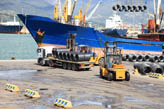Overview of Sea Cold Storage: A Comprehensive Guide
Marine refrigeration, commonly referred to as sea cold storage, plays a vital role in maintaining the quality and safety of perishable goods during transportation. This article explores the key aspects of marine refrigeration systems, their benefits, and their importance in modern logistics.
Marine refrigeration systems are designed to keep products at precise temperatures, ensuring they remain fresh and protected from environmental factors. These systems are essential for transporting goods such as food, pharmaceuticals, and precious machinery, where temperature control is critical. The efficiency of these systems is enhanced by advanced technologies, including multi-refrigerator setups and temperature monitoring tools.
One of the primary advantages of marine refrigeration is its ability to preserve the integrity of goods. By maintaining optimal temperatures, it prevents damage from excessive heat or exposure to cold. Additionally, these systems are energy-efficient, reducing operational costs and their environmental impact.
In conclusion, marine refrigeration systems are indispensable in the logistics industry, offering reliable temperature control and protecting goods throughout their journey. As global trade continues to grow, the importance of such systems in maintaining product quality and safety cannot be overstated.
